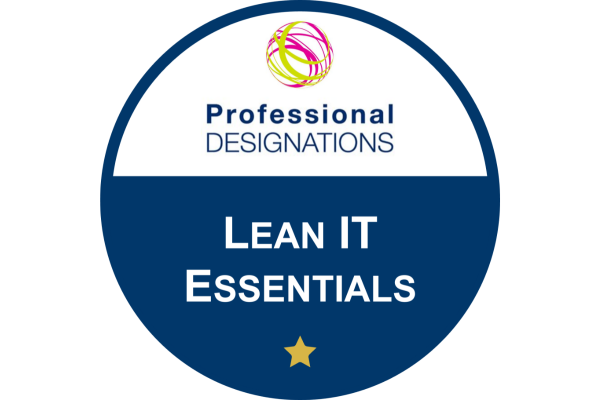
Lean IT Essentials Course & Examination

This two-day certification course provides the fundamental knowledge and practical guidance required to utilise key aspects of problem-solving methods and to execute continual improvement. The principles of Lean IT are applicable to all IT operations regardless of industry or sector. Any organisation that effectively applies Lean IT will notice increased user and customer satisfaction, reductions of IT costs, increased productivity, and an ability to manage demand more efficiently.
Course inclusions:
Lean IT provides practical guidance that focuses on the improvement of whatever processes already exist within the organisation. Regardless of the framework or standard your IT organisation has chosen, the central focus of Lean IT is learning how to assess any business process to eliminate waste, where waste is defined as something that adds no value to a product, service, or output. It is also a crucial and basic approach that can help an organisation better position itself to begin its digital transformation journey.
Implementing Lean IT’s mindset, concepts, and techniques can lead to:
The Lean IT Essentials entry-level course is the first in the Lean IT certification scheme that’s been defined by Professional Designations Corp. (PDC), and it is a mandatory requirement for taking the other two advanced courses: Lean IT Kaizen and Lean IT Leadership.
This course prepares you for the exam leading to the Lean IT Essentials certificate. Based on the core principles of Lean, the two-day Essentials course will help IT departments become more business-value oriented, which will result in removing waste, inflexibility, and variability.
Lean IT Essentials focuses on providing actionable improvements to six major components: the customer, processes, performance, the Lean organisation, behaviour and attitude, and problem-solving/kaizen.
Upon completion, participants of this course will be able to:
This certification course is part of Professional Designations’ new designation scheme for integratedITSM™ and is required to achieve the following designations:

Lean IT Essentials is for IT professionals who need to understand how to assess their current business processes to identify and eliminate waste, which results in a faster and higher-quality delivery of business value.
There are no prerequisites for this certification.
The exam is offered through Professional Designations (PDC) and to obtain certification, attendees must write and pass the exam as follows. The exam is included in the course fee and will be provided on the first day of the course.
Material for this course will only be provided as downloadable soft copy files that can be viewed on a variety of devices. Attendees may print a hard copy of the files in whatever format best meets their needs and can use the files under ITSM Hub’s Terms of Use.
Lean IT Essentials online exam voucher, provided by Professional Designations (PDC) - global examination provider
Plus a complimentary Lean IT Essentials exam re-sit if you miss out on passing your certification the first time.
The Lean IT Essentials official publication eBook is included with your exam voucher, which you will be able to download through the Professional Designations portal.
After completion of this course, you may apply for self-directed learning PDUs through PMI. A letter of attendance is available upon request.
After completion of this course, you may apply for self-directed learning PDU's through PMI. A certificate of attendance is available upon request.
This course enables participants to develop their knowledge and proficiency in the following Skills Framework for the Information Age (SFIA®) professional skills:
This list gives the core SFIA skills covered by the course. Elements relevant to other SFIA skills may also be included to a lesser depth. Proficiency in a SFIA skill is measured by performance assessment and is achieved through actual substantial use of that skill in a real-world situation over some time. In course assignments and exercises undertaken through a course can demonstrate elements of the relevant skills which can then be further developed back in the workplace. Acquiring new skills and building on existing skills, ideally occurs within the context of an agreed development plan for each person that ensures that their personal circumstances, strengths and development needs are met.
An amazing instructor who explained the content very clearly and at a very good pace. This was a good balance and approach to learning in a three day intensive period. I found the worked examples very practical and very relatable to the Defence industry sector I work in.
Satisfied Customer
Really good facilitation, kept me interested and shared so many practical applications.
Satisfied Customer
Gave me a better understanding of concepts, theories and tools to formalise and improve my current relationship management.
Satisfied Customer
The instructor was very professional and was able to explain each area thoroughly and is available for Q&A.
Satisfied Customer
Back to Lean IT course